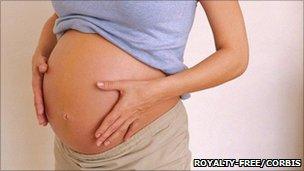Obesity 'behind rise in Caesareans in Wales'
- Published

Wales has the highest rate of obese pregnant women in the UK
Obesity is a major factor behind an increase in the number of women giving birth by Caesarean section in Wales, say clinicians.
Welsh Assembly Government figures show that in 2009-10 more than one in four expectant mothers had the operation instead of a natural birth.
The figure marks a 3% rise over 10 years and is thought to be linked to Wales' high obesity rate.
The assembly government said it is keen to encourage natural births.
Wales has the highest rate of obese pregnant women in the UK, according to figures held by the assembly government.
Back in December a study by the Centre of Maternal and Child Enquiries, found that Caesarean section deliveries accounted for 37% of all single birth deliveries for obese women in the UK.
The latest figures, external, published by the assembly government, show the Caesarean section rate rose from 24% in 2000-01 to 27% in 2009-10.
In almost half the cases women elected to have surgery, while the rest were emergency procedures.
Dr Alex Rees, a spokeswoman for the Royal College of Obstetricians and Gynaecologists, said the high rate was a source of "some disappointment" for midwives.
But she added that "choosing" a Caesarean only ever happened for medical reasons and when expectant mothers had other health issues.
She said: "It's not entirely surprising because we are seeing Caesarean rates rise around the UK and obesity is one of the reasons.
"Increased Body Mass Index (BMI) brings other health problems like larger babies, pregnancy diabetes and pre-eclampsia, but it is a complex issue and there are other factors involved.
"In Cardiff for example, we have a rising ethnic minority population, some of whom have their own health issues."
She added that advancements in health care mean women, such as transplant patients who may not have been able to get pregnant before, are also now having babies and may need extra care at the time of delivery.
"There is also the issue of seniority and experience as European directives on 24-hour working mean junior doctors are doing less across the board in medicine and so have less experience.
"They might then find a Caesarean a preferable procedure to a complex instrument delivery."
Among mothers under 20, 16% had a Caesarean section, compared to 42% of mothers over 40.
An assembly government spokesperson said: "The Welsh Assembly Government, doctors and midwives in Wales are keen to encourage normal births, either at home or in hospital and to reduce the need for medical interventions, unless that is what is needed in the best interest of the mother and child.
"It is important that expectant mothers are given all the support and help throughout pregnancy to ensure they have a stress-free birth.
"It is therefore mainly down to safety issues and what is in the best interest of the mother and baby.
"Each health board in Wales has developed an action plan for reducing unnecessary interventions in birth. These plans are being implemented and we are monitoring progress."
- Published3 February 2011
- Published26 January 2011